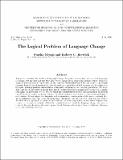| dc.description.abstract | This paper considers the problem of language change. Linguists must explain not only how languages are learned but also how and why they have evolved along certain trajectories and not others. While the language learning problem has focused on the behavior of individuals and how they acquire a particular grammar from a class of grammars ${cal G}$, here we consider a population of such learners and investigate the emergent, global population characteristics of linguistic communities over several generations. We argue that language change follows logically from specific assumptions about grammatical theories and learning paradigms. In particular, we are able to transform parameterized theories and memoryless acquisition algorithms into grammatical dynamical systems, whose evolution depicts a population's evolving linguistic composition. We investigate the linguistic and computational consequences of this model, showing that the formalization allows one to ask questions about diachronic that one otherwise could not ask, such as the effect of varying initial conditions on the resulting diachronic trajectories. From a more programmatic perspective, we give an example of how the dynamical system model for language change can serve as a way to distinguish among alternative grammatical theories, introducing a formal diachronic adequacy criterion for linguistic theories. | en_US |
